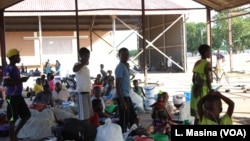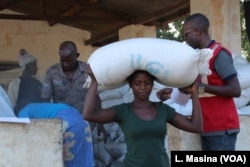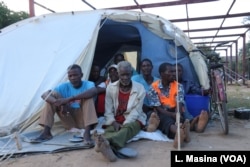As Malawi gears-up for elections this month, candidates and voters say flooding from March’s Cyclone Idai has already negatively impacted the vote. Some registered voters living in evacuation camps lost voting registration certificates in the floodwaters while candidates say they can’t get their message to would-be supporters living in evacuation camps.
Mafulesi Khingi from Manjolo Village is among thousands of eligible voters still living in evacuation camps two months after Cyclone Idai.
The tropical storm that hit Mozambique, Malawi and Zimbabwe in March flooded them out of their homes.
Khingi said the floodwaters also swept away her voter registration and those of six other family members.
We had no time to rescue our voter certificates, she said, because the house was collapsing. The only thing they could do, says Khingi, was to run for their dear lives.
Not having a voter certificate means having to explain why to officials who then look-up registration at the polls before they can vote.
While Malawi election authorities say it should not prevent voting, the extra step could deter voters, especially those who are not informed.
Cyclone Idai flooding killed 60 people in Malawi and displaced nearly 90,000 households in 15 districts.
But it could also have an impact on the general elections held every five years.
Gladys Ganda is a parliamentary candidate for the ruling Democratic Progressive Party in Nsanje district.
She said Cyclone Idai’s displacement of people is preventing her from campaigning in affected areas.
“In the sense that people are not in their homes. Some people are camping in various camps and obviously when you go to do campaign, you will not find people around that area and you also not allowed to campaign at the camps,” she said.
Ganda said not being allowed to campaign in the evacuation camps has made it difficult for candidates like her to promote their platforms.
Bizel Bishop, a flood survivor at Bangula evacuation camp, agrees.
He said they are not properly getting the issues raised by the candidates because the candidates are not allowed to campaign at the camp. And returning home is also difficult, says Bishop, because there they have no food. They can only wait for the government to help their return home where they will be able to attend campaign rallies.
Lusizi Nhlane is Commissioner for Malawi’s southern flood-hit Chikwawa district.
He said allowing campaign rallies at evacuation camps would bring chaos as they are already too crowded.
But Malawi’s Electoral Commission says banning campaign rallies at evacuation camps deprives the flood survivors of being informed voters.
Sam Alufandika is the commission’s Chief Elections Officer.
“As Malawi Electoral Commission we have not received this [complaint] officially but we will do our own investigation to find out why they are not allowed to go to the camps. Because everybody is supposed to be reached out. They have to know what these candidates are offering for them to have an informed choice on polling day and those who are affected by floods cannot be left out,” he said.
Malawi’s government has announced it will start closing the evacuation camps on May 14, just one week before elections.






